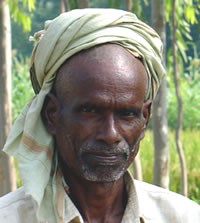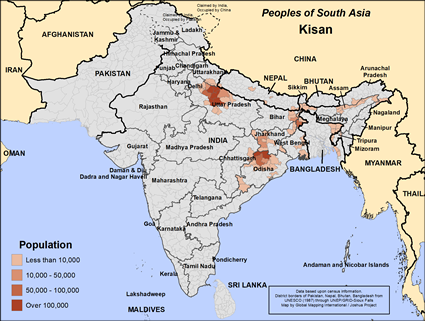Kisan in India

Photo Source:
Copyrighted © 2026
Anonymous All rights reserved. Used with permission |

Map Source:
People Group data: Omid. Map geography: UNESCO / GMI. Map Design: Joshua Project
|
| People Name: | Kisan |
| Country: | India |
| 10/40 Window: | Yes |
| Population: | 1,571,000 |
| World Population: | 1,578,300 |
| Primary Language: | Hindi |
| Primary Religion: | Hinduism |
| Christian Adherents: | 1.74 % |
| Evangelicals: | 0.00 % |
| Scripture: | Complete Bible |
| Ministry Resources: | Yes |
| Jesus Film: | Yes |
| Audio Recordings: | Yes |
| People Cluster: | South Asia Tribal - other |
| Affinity Bloc: | South Asian Peoples |
| Progress Level: |
|
Introduction / History
Operation World states, "India's ancient, complex, and often difficult to understand past, it's racial, ethnic, religious, and linguistic diversity, and the caste system, all make detailed population analysis very difficult."
Kisan people are classed as a scheduled caste. This benefits them in work, parliament, and in other areas. Kisan means "farmer."
Where Are they Located?
Kisan people live in India, in the states of Uttar Pradesh, West Bengal, Bihar, and Orissa. Many Kisan may now be living in Jharkhand in India. They are called by names according to the states in which they live.
What Are Their Lives Like?
Kisan use the languages of the states in which they live, however, there is general knowledge of spoken Hindi and Urdu. This is notable, because written and audio scriptural resources are available in these languages.
Kisan are landowners, who cultivate, and agriculture is their main occupation. Those who have no land usually work as agricultural laborers. In West Bengal, they often work on tea plantations.
Many Kisan are tribal peasants who sell honey and wild flowers. They eat rice, mutton, poultry and eggs among other foods. The Kisan men drink alcohol, mostly locally brewed, or home brewed.
Many parents cannot afford education for their children, so many have literacy problems. Many are victims of private moneylenders who charge high interests.
They prefer adult marriages. Marriage with the daughter of a mother's brother is accepted, except in Behar. Divorce is allowed in cases such as adultery, cruelty, and impotence. Parental property is divided equally among the sons. Women have roles in money, social, and religious matters. They have traditional councils at the village level to solve disputes.
What Are Their Beliefs?
Millions of Hindu pilgrims visit Varanasi on the Ganges River, but they will not find there the Living Water of the One who died in their place to pay the penalty for their sin. Kisan are Hindus and worship all the man gods and goddesses. They also worship gods from their tribal roots. They observe Hindu festivals. The Brahmin priests are called Purohit, and local priests perform ceremonies. They use medicine men.
Kisan have pollution periods for both births and deaths. In West Bengal, the dead are mainly cremated, and in Orissa, they are buried.
What Are Their Needs?
Human suffering and disease is immense. Cities are crowded and polluted. Rural areas have no amenities, infrastructure, or power. There is a severe shortage of health care facilities. Disease is widespread. Medical care and instruction are desperately needed.
Kisan people are unreached. Uttar Predesh, alone, possibly represents the most intense concentration of unevangelized people and groups in the world, and therefore, the greatest mission challenge. Thankfully, this is changing today.
Prayer Points
Pray that use of the JESUS Film in Hindi and Urdu will bare much spiritual fruit as Kisan people see and hear God's truth, and that churches will be planted as a result.
Pray for a major mobilization of prayer in churches worldwide for Kisan people.